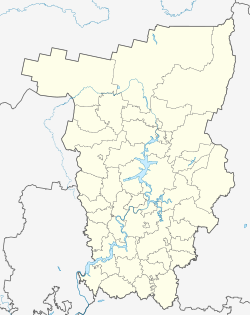Kungur
| Kungur (English) Кунгур (Russian) |
|
|---|---|
| - Town - | |
 Central Kungur (October 2010) |
|
 Location of Perm Krai in Russia |
|
|
|
|
|
|
|
|
|
|
| Administrative status (as of December 2011) | |
| Country | Russia |
| Federal subject | Perm Krai |
| Administratively subordinated to | town of krai significance of Kungur |
| Administrative center of | Kungursky District, town of krai significance of Kungur |
| Municipal status (as of December 2011) | |
| Urban okrug | Kungur Urban Okrug |
| Administrative center of | Kungur Urban Okrug, Kungursky Municipal District |
| Statistics | |
| Population (2010 Census) | 66,074 inhabitants |
| - Rank in 2010 | 236th |
| Time zone | YEKT (UTC+05:00) |
| Founded | 1648 |
|
|
|
| on | |
Kungur (Russian: Кунгу́р) is a town in the southeast of Perm Krai, Russia, located in the Ural Mountains at the confluence of the Iren and Shakhva Rivers into the Sylva River (Kama's basin). Population: 66,074 (2010 Census);68,943 (2002 Census);81,402 (1989 Census); 64,800 (1959); 36,000 (1939).
Kungur was founded 17 kilometers (11 mi) above the Iren River's mouth on the banks of the Kungurka River in 1648. In 1662, it was burnt by Bashkirs. In 1663, it was rebuilt as a fortress on the place of the village of Mysovskoye. In the beginning of the 18th century, leather and footwear industries started to develop here, and in 1724, a tannery was built. By the mid-18th century, Kungur became one of the most populated areas in the Urals. In 1759, Perm administration of mining plants was moved to Kungur. By the end of the 18th century, Kungur is an important transit trade center of the Siberian road, as well as the center of leather manufacture in Perm Governorate. Kungur rope and linseed oil were widely known. In 1774, the town withstood a siege by Yemelyan Pugachev's Cossack forces. By the end of the 19th century, Kungur had become a significant industrial (including manufacture of leather footwear, gloves, and mittens) and cultural center.
In 1890 the Kungurian Age of the Permian Period of geological time was named for Kungur.
...
Wikipedia



